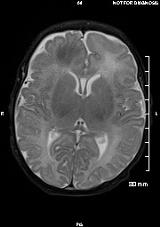Two Extreme Faces of Newborn Status Epilepticus and Epileptic Encephalopathy
Abstract number :
3.204
Submission category :
4. Clinical Epilepsy / 4C. Clinical Treatments
Year :
2018
Submission ID :
505088
Source :
www.aesnet.org
Presentation date :
12/3/2018 1:55:12 PM
Published date :
Nov 5, 2018, 18:00 PM
Authors :
Samiya Ahmad, Baylor College of Medicine and Yu-tze Ng, Baylor College of Medicine
Rationale: To present two very contrasting treatments and outcomes on two newborn boys with refractory seizures from birth and major cerebral malformations. Methods: Patient 1 presented with seizures within 24 hours of life. Initial EEG showed burst-suppression pattern with frequent focal seizures with rapid generalization. Brain MRI showed isolated large right frontal cortical dysplasia (Figure 1) and genetic testing revealed TSC2 mutation. He was treated with nine antiepileptic drugs and modified ketogenic diet. He developed infantile spasms by age 3 months. Right tailored frontal lobectomy was performed at 6 months of age and resulted in dramatic improvement in clinical seizures and EEG background which enabled his discharge from the NICU.Patient 2 was diagnosed antenatally with possible brain tumor, subsequently identified as left mesio-occpital hemimegalencephaly, schizencephaly and polymicrogyria (Figure 2). Day 3 EEG showed abundant left occipital-onset epileptiform discharges and frequent electrographic seizures. Results: Patient 1 is now age 3, has reasonable seizure control on three antiepileptic drugs but has intellectual disability and left hemiparesis.Patient 2 at 22 months of age is seizure-free on monotherapy and has a normal EEG. He has appropriate development and is delightful, running and speaking in brief sentences! Conclusions: We describe two severe neonatal epileptic encephalopathy patients presenting essentially with status epilepticus; both with major cortical malformations but remarkably different treatments and outcomes. Stepwise progression of treatment as necessary up to life-saving neurosurgery is appropriate, although “prophylactic” treatment, including early epilepsy surgery, may not be warranted as the prognosis of such patients appears to be very individualized. Funding: None

.tmb-.jpg?Culture=en&sfvrsn=9220e38e_0)